| Srl | Item |
| 1 |
ID:
118602
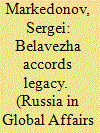

|
|
|
|
|
| Publication |
2012.
|
| Summary/Abstract |
The USSR ceased to exist in December 1991, but the dramatic events of the two subsequent decades have shown that it is premature to view its collapse as a closed chapter of history. The termination of the Soviet Union's existence as a legal fact and the historical process of its disintegration are different things. The country that accounted for one-sixth of the planet's land is gone from the world map, but the disintegration of Soviet statehood persists. Like the breakup of the Western Roman Empire does not boil down to the abdication of Romulus Augustus, or the French Revolution to the storming of the Bastille, or Russia's 1917 October Revolution to the October 25 (in the Julian calendar) coup, the breakup of the USSR is not confined to the December 1991 Belovezha declaration by heads of states of Russia, Ukraine and Belarus on its dissolution. That the process still continues is evidenced by eight armed conflicts, the de-facto emergence of new states (two of which have won international, albeit limited, recognition), unending border disputes, ethnic and religious clashes, and regional conflicts. In 2008 a precedent was created when the borders of former Soviet republics were redrawn. Given unsettled ethno-political conflicts, it is hard to predict when and how these borders will be recognized, and where the self-determination process, launched by Mikhail Gorbachev's perestroika policy, will stop.
|
|
|
|
|
|
|
|
|
|
|
|
|
|
|
|
| 2 |
ID:
129532
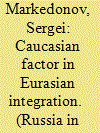

|
|
|
|
|
| Publication |
2014.
|
| Summary/Abstract |
Moscow has made the largest progress in Eurasian integration with Armenia. It has had no integration plans (given numerous constraints) with regard to Azerbaijan or Georgia. Yet Russia's victory cannot be regarded complete or unequivocal. Eurasian integration is one of Russia's key foreign policy priorities at present, viewed as an instrument to bolster its influence in the international arena. As President Vladimir Putin said, "We propose a model of a powerful, supranational union, capable of becoming one of the poles of the modern world and playing an effective role in linking Europe to the thriving Asia-Pacific region."
Prospects for a major reconfiguration of the post-Soviet space emerged after the Customs Union agreement became effective in July 2010. It was followed by three-and-half-years efforts by Russia and its closest partners Belarus and Kazakhstan to institutionalize the Eurasian integration project, which opened the possibility of other former Soviet republics joining the core "union of three
|
|
|
|
|
|
|
|
|
|
|
|
|
|
|
|
| 3 |
ID:
107964
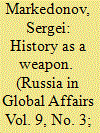

|
|
|
| 4 |
ID:
073615
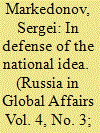

|
|
|
|
|
| Publication |
2006.
|
| Summary/Abstract |
The formation of Russia's new national policy is taking place amidst the broadening global crisis concerning the concept of the nation-state, which is instigated by the confrontation between globalization and ethnic separatism. Russia has a unique opportunity to reconsider and reformulate particular values of the nation-state.
|
|
|
|
|
|
|
|
|
|
|
|
|
|
|
|
| 5 |
ID:
105054
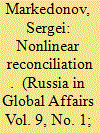

|
|
|
|
|
| Publication |
2011.
|
| Summary/Abstract |
Still, even though one can state a decline in the complicated dynamics of Armenian-Turkish normalization, it would be wrong to speak of a total standstill in this process. After all, peace processes practically always have a nonlinear development. The ideas of reconciliation with the neighbor have become part of the internal discourse in both Armenia and Turkey.
|
|
|
|
|
|
|
|
|
|
|
|
|
|
|
|
| 6 |
ID:
127427
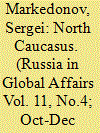

|
|
|
|
|
| Publication |
2013.
|
| Summary/Abstract |
While previously developments in the North Caucasus were primarily looked at from the viewpoint of inter-ethnic relations and regional policies, today this theme has expanded to a pan-Russian scale. It is not Chechnya, Ingushetia, or Dagestan per se that matter; rather, it is how the Russian heartland perceives those regions.
|
|
|
|
|
|
|
|
|
|
|
|
|
|
|
|
| 7 |
ID:
077100
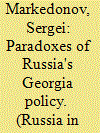

|
|
|
| 8 |
ID:
083941
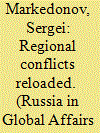

|
|
|
| 9 |
ID:
068997
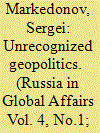

|
|
|
| 10 |
ID:
083280
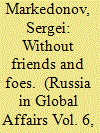

|
|
|
|
|
| Publication |
2008.
|
| Summary/Abstract |
Azerbaijan has received greater international interest due to its hydrocarbon resources and the increased importance of the Caspian region at large as an alternative source of energy for the European market. Located at an intersection of interests of various countries, Azerbaijan has to conduct an accurate and flexible foreign policy
|
|
|
|
|
|
|
|
|
|
|
|
|
|
|
|